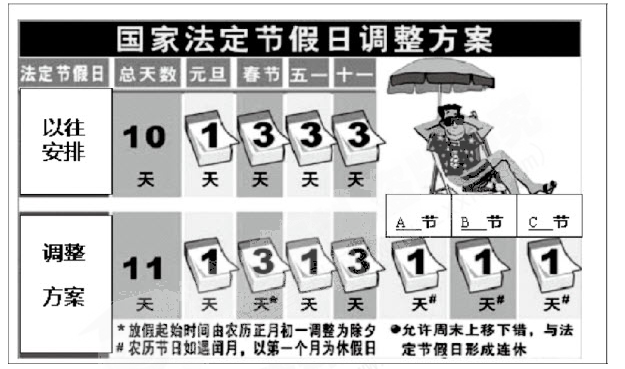材料一 《国务院关于修改〈全国年节及纪念日放假办法〉的决定》已从2008年1月1日起施行。

材料二 这次调整国家法定节假日制度,国务院有关部门一年多来组织开展了多方面的工作,包括开展专题调研,召开多 次座谈会,不断听取和征求人大代表、政协委员、专家学者及有关部门的意见和建议,并在人民网、新华网、国家发展和改革委员会网站,以及新浪、搜狐等门户网站上予以公布,进行民意调查,广泛征求群众意见。国家对法定节假日进行调整,最大的亮点就是民众成为政府决策的“参谋”。
次座谈会,不断听取和征求人大代表、政协委员、专家学者及有关部门的意见和建议,并在人民网、新华网、国家发展和改革委员会网站,以及新浪、搜狐等门户网站上予以公布,进行民意调查,广泛征求群众意见。国家对法定节假日进行调整,最大的亮点就是民众成为政府决策的“参谋”。
材料三 在我们身边,有些人热衷于过“洋节”,却对中 * * 传统节日不感兴趣,认为我国民族传统节日的吸引力不强。
(1)体验探究:在这次国家法定节假日调整方案中,除了春节、除夕外,上图A、B、C三处所代表的中 * * 传统节日名称分别是 、 、 。你知道我国还有哪些主要民族传统节日?(3分)
(2)这次国家法定节假日制度调整,体现了法定节假日向民族传统节日倾斜的原则。请从《文化生活》角度,谈谈将民族传统节日设为国家法定假日的意义。(4分)
(3)请就如何增强我国民族传统节日的吸引力谈谈你的看法。(5分)
(1)清明、端午、中秋,还有元宵节、重阳节等。
(2)文化对人的影响是潜移默化和深远持久的,将民族传 统节日设为国家法定假日具有重大意义。有利于人们了解中 * * 传统文化,提升传统文化的影响力,传承和弘扬中 * * 文化;有利于展示中 * * 文化的魅力,促进民族团结,增强对中华文化的认同感和民族凝聚力;有利于增强人们的亲情感,促进家庭和睦、社会稳定,构建社会主义和谐社会。
统节日设为国家法定假日具有重大意义。有利于人们了解中 * * 传统文化,提升传统文化的影响力,传承和弘扬中 * * 文化;有利于展示中 * * 文化的魅力,促进民族团结,增强对中华文化的认同感和民族凝聚力;有利于增强人们的亲情感,促进家庭和睦、社会稳定,构建社会主义和谐社会。
(3)①利用班会、校会、社区服务等活动宣传民族传统节日的文化内涵。②开展丰富多彩的节日活动,引导群众积极参加健康有益的文体活动。③“推陈出新,革故鼎新”,对传统节日的形式和内容加以创新性继承。(只要答案能够围绕“宣传”、“活动”、“创新”三个方面提出合理建议,即可酌情给分。)
